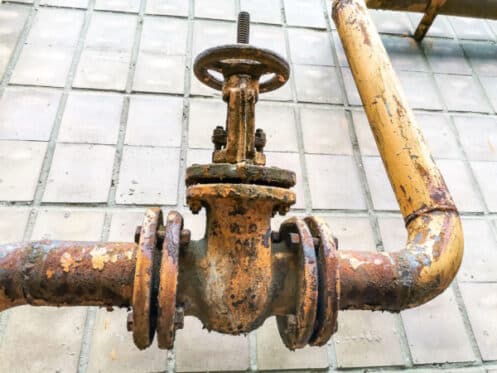Maintaining a functional unclogged sewer system is crucial for any property. It ensures the smooth flow of wastewater from your living space to the municipal sewage system. However, issues like blockages or malfunctions can cause a range of problems. Read on to discover the intricate world of backed-up sewers, including the warning signs, the underlying causes, and the multifaceted ramifications that can impact your property, health, and the environment. By understanding these dynamics, you can take proactive steps to prevent and mitigate the effects of a sewer backup.
Signs of a Backed-Up Sewer
- Slow draining fixtures
- Gurgling noises
- Foul odors
- Water backing up in drains, sinks, and toilets
- Wet spots in the yard
- Backflow in the basement
- Mold growth
Causes of Sewer Backups
Clogs and Blockages
Sewer backups can occur when grease, food scraps, hair, paper products, and even non-flushable items like wet wipes are flushed down toilets or poured into drains. Over time, these materials can accumulate in sewer lines, obstructing the flow of wastewater, which causes backup in drains and toilets.
Tree Root Infiltration
Tree roots are notorious for infiltrating sewer lines through small pipe cracks and joints. As trees continue to grow, their roots can expand and cause undue pressure in sewer pipes, causing them to crack or collapse. Additionally, tree roots can obstruct the flow of wastewater.
Aging Infrastructure
Pipes made of clay or cast iron may corrode, crack, or collapse over time, reducing their capacity to carry wastewater. This deterioration increases the likelihood of blockages and backups.
Heavy Rainfall and Stormwater
In times of heavy rainfall or intense storms, the amount of water entering the sewer system can surpass its holding capacity. This can lead to a phenomenon known as combined sewer overflow, where stormwater and untreated sewage mix and overload the sewer system.
Improper Flushing and Disposal
To avoid sewer backups, it’s crucial to exclusively flush items that are designed to go down the toilet. Non-flushable items such as feminine hygiene products, cotton balls, and diapers should never be flushed down toilets. Also, refrain from pouring hazardous substances down the drain as they can lead to pipe blockages.
Structural Damage
Earthquakes, construction work, and shifts in the ground can cause structural damage to sewer lines. Cracked or collapsed pipes can restrict wastewater flow, leading to backups.
Grease Buildup
Grease and fat poured down kitchen sinks can solidify within pipes, gradually reducing the inside diameter of the pipe and causing blockages. This is a common issue in residential areas and restaurant districts.
Inadequate Maintenance
Neglecting sewer line maintenance, such as cleaning and inspections, can exacerbate existing plumbing issues, consequently leading to backups. Proactive maintenance can help identify potential sewer problems early before they escalate.
Health and Safety Concerns
When wastewater flow is obstructed, it stagnates and accumulates within the plumbing and drainage systems. This can lead to potential hazards, such as exposure to disease-causing microorganisms. Sewage contains multiple bacteria, viruses, and parasites that may result in illnesses upon contact.
Apart from infectious agents, a backed-up sewer system can also release toxic gases into your living space. Methane and hydrogen sulfide are common byproducts of decomposing organic matter. These gases contribute to foul odors and can also be dangerous at high concentrations, causing symptoms like headaches, dizziness, and even asphyxiation in extreme cases.
Environmental Implications
Contamination of Water Bodies
When sewage overflows, harmful bacteria, pathogens, chemicals, and other pollutants may get transferred into the main water line. This can lead to a decrease in water quality, which poses a threat to both humans and aquatic life. Additionally, the excessive nutrient load from sewage can cause algae blooms and oxygen depletion, leading to eutrophication.
Impact on Aquatic Life
When sewage spills into bodies of water such as rivers, oceans, and lakes, harmful toxins and pollutants can seep into the water. This can have a severe impact on fish and other aquatic organisms. Furthermore, the organic matter in the sewage can lead to oxygen depletion, causing hypoxic conditions that make the water unable to support marine life. As a result, fish and other aquatic organisms may die, disrupting the entire food chain within the aquatic ecosystem.
Soil Contamination
Sewage contains harmful substances that can seep into the soil, potentially leading to long-term pollution. This contamination affects the immediate area and can spread through groundwater, affecting wider regions over time.
Contribution to Urban Runoff
When there are heavy rains and storms, the sewage system may become inundated with excess rainwater. This can cause untreated wastewater to overflow onto surfaces such as roads and pavements causing health issues.
Preventing Sewer Backups
Regular Inspections and Maintenance
When you schedule regular inspections with our experienced plumbers, you can trust that we will identify and resolve potential plumbing problems before they escalate. During a maintenance visit, we will carefully assess the condition of your sewer lines, detect blockages or tree root intrusions, and address any wear and tear. Our expert plumbers are proficient in both drain snaking and hydro jetting techniques, ensuring that your sewer system remains clear and wastewater flows smoothly at all times.
Install Backflow Prevention Devices
These are gadgets that help prevent sewage from flowing back into your property. These devices are particularly useful in areas prone to flooding or heavy rains, as they can prevent excess rainwater from overwhelming the sewer system, thereby avoiding sewer backups.
Tree Root Management
It is advisable to conduct regular inspections of your property to identify trees with invasive root systems. If any such trees pose a threat to your sewer lines, it may be necessary to relocate or remove them.
Proper Drainage System
Make sure the drainage system of your property is set up in a way that directs water away from the foundation and sewer lines. If the grading is not done properly or the drainage is poor, it can lead to excess water entering the sewer system, contributing to backups during heavy rainfall.
Grease Traps
If your property has a commercial kitchen or generates significant grease, installing grease traps can help prevent fats, oils, and grease from entering the sewer system. These traps capture greasy and oily substances before they solidify and clog the sewer pipes.
Upgrade Aging Pipes
If you have old or damaged sewer pipes on your property, it’s worth considering replacing or relining them. With modern plumbing materials and construction techniques, the chances of future backups can be significantly reduced.
Install Sump Pumps
Sump pumps effectively prevent basement flooding and sewer backups caused by rising groundwater levels. Properly functioning sump pumps can redirect excess water away from your property’s foundation and sewer system.
Call the Experts
To protect your property from the adverse effects of sewer backups, partnering with professionals who offer comprehensive plumbing services can provide invaluable assistance. At Comfort Zone Heating & Air Conditioning, we are trusted and renowned for our exceptional plumbing solutions and dedication to customer satisfaction. From plumbing inspections and maintenance to addressing sewer system issues, you can rely on us to handle any plumbing problem with ease. Ready to protect your property from the risks of sewer backups and ensure a safe, comfortable living space? Contact Comfort Zone Heating & Air Conditioning today to schedule the best plumbing services in Cobourg.




